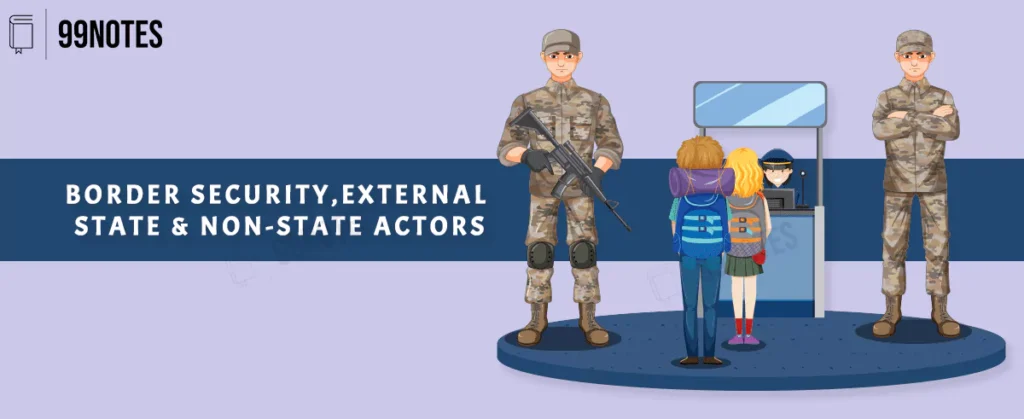
Border Security ,External State & Non-State Actors Free UPSC Notes Download
Border Security ,External State & Non-State Actors
Border security is a significant issue for many countries, as it is important for protecting a nation’s sovereignty and ensuring the safety of its citizens.
External states, or foreign countries, can often have an impact on a nation’s border security, either through direct involvement or through the actions of non-state actors operating within their borders.
Non-state actors, such as terrorists, smugglers, and human traffickers, can also pose a threat to border security. In this essay, I will discuss various aspects of border security, including the role of external states and non-state actors, and strategies that can be employed to address these challenges.
- One of the primary challenges in border security is the potential for external states to interfere with a nation’s sovereignty. This can take many forms, including the use of military force, economic coercion, and diplomatic pressure. For example, a foreign country may seek to influence the domestic policies of another country through the use of economic aid or trade agreements. Alternatively, they may use military force or the threat of military force to achieve their objectives. This can be particularly problematic in the case of disputes over territory, resources, or political ideology.
- Another aspect of border security that can be influenced by external states is the movement of people across national borders.
- This can include both legal and illegal migration, as well as the smuggling of goods and people. External states can have an impact on these flows through a variety of means, such as visa policies, deportations, and other measures.
- For example, a country may tighten its visa requirements in order to reduce the number of people entering from certain countries, or it may deport individuals who are in the country illegally.
- Non-state actors can also pose a threat to border security. These groups, which may include terrorists, smugglers, and human traffickers, can operate across national borders and exploit weaknesses in a country’s security systems.
- For example, terrorists may seek to use international travel as a means of transporting people, weapons, or other illicit materials. Smugglers may seek to bring illegal goods, such as drugs or weapons, into a country, while human traffickers may exploit vulnerable individuals, such as refugees, for financial gain.
- There are a number of strategies that can be employed to address these challenges to border security. One approach is to strengthen international cooperation and coordination. This can involve sharing intelligence and other information, as well as working together to develop and implement effective strategies for addressing transnational threats.
Another approach is to enhance border control measures. This can include improving physical infrastructure, such as fences and surveillance systems, as well as investing in technology and training for border personnel. It can also involve implementing more stringent visa requirements and stricter enforcement of immigration laws.
Finally, it is important to address the root causes of transnational threats, such as poverty, conflict, and political instability. This can involve providing development assistance and supporting initiatives that promote peace and stability in conflict-affected regions. It may also involve working with other countries to address the underlying drivers of migration, such as economic disparities or persecution.
In conclusion, border security is a complex and multifaceted issue that involves a range of challenges and strategies. External states and non-state actors can both have an impact on a country’s border security, and it is important for governments to be proactive in addressing these threats. By strengthening international cooperation, enhancing border control measures, and addressing root causes, countries can work to protect their sovereignty and ensure the safety and security of their citizens.
Other Topics Related to Internal Security:

